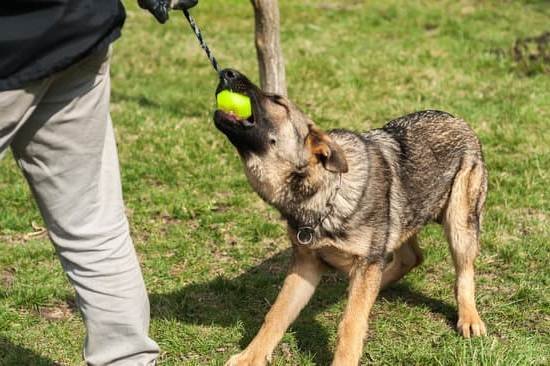Newfoundland dogs are known for their gentle giant demeanor and impressive strength, but are Newfoundland dogs easy to train? These massive yet lovable creatures have captured the hearts of many dog lovers, but their trainability often becomes a point of contention among potential owners. In this article, we will delve into the world of Newfoundland dogs and examine their characteristics, temperament, and history to understand just how easy (or challenging) they are to train.
Originating from the Canadian island of Newfoundland, these dogs were initially bred as working companions for fishermen. Their webbed feet and thick waterproof coats made them well-suited for tasks such as water rescue and retrieving fishing nets in frigid North Atlantic waters. Over time, these gentle giants made their way into the homes of families where they earned a reputation for being devoted and loving pets.
Newfoundland dogs are known for their patience, loyalty, and affectionate nature. However, their large size and independent mindset can pose challenges when it comes to training. Despite their friendly disposition, these dogs require dedicated training to ensure they remain well-behaved and obedient companions. Throughout this article, we will explore the various aspects of Newfoundland dog training to provide valuable insights for current or prospective owners.
History and Origin of Newfoundland Dogs
The Newfoundland dog is a large working breed known for its strength, intelligence, and gentle disposition. They were originally bred as working dogs for fishermen in the Dominion of Newfoundland (now part of Canada), where they assisted with hauling nets and rescuing people at risk of drowning. Their history can be traced back to the early 18th century, where they were likely descendants of indigenous Canadian dogs and European breeds brought over by explorers and settlers.
History and Origin of Newfoundland Dogs
The characteristics that make Newfoundland dogs excellent swimmers and rescue dogs are believed to have been developed through their breeding with various European breeds such as the Great Pyrenees, Mastiffs, and Portuguese Water Dogs. These influences gave them their distinctive webbed feet, dense water-resistant coat, and strong build.
During the 19th century, Newfoundland dogs gained popularity in Europe as both working dogs and pets. Their reputation as loyal companions and their impressive abilities made them highly sought after. The breed found its way into the hearts of many, including notable figures such as English painter Sir Edwin Landseer, who often depicted these beloved dogs in his artworks.
- Origins in the Dominion of Newfoundland
- Breeding with European breeds
- Popularity in Europe during the 19th century
Characteristics and Temperament of Newfoundland Dogs
Newfoundland dogs are known for their gentle and sweet nature, making them excellent family pets. These large, strong dogs are often referred to as “gentle giants” due to their calm and patient temperament. Newfoundland dogs are very loyal and protective of their families, making them great watchdogs. They are also known for being good with children, which adds to their appeal as family pets.
Characteristics of Newfoundland Dogs
Newfoundland dogs have a distinct appearance with their thick double coat that comes in black, brown, gray, or Landseer (white with black markings). They have webbed feet, which make them excellent swimmers, and they are known for their natural swimming abilities. Their size can be intimidating, with males typically weighing between 130-150 pounds and standing at 28 inches tall at the shoulder. Despite their large size, they move gracefully and can be surprisingly agile.
Temperament of Newfoundland Dogs
In addition to being gentle and loving, Newfoundland dogs are also known for being very intelligent. They are eager to please their owners and are generally well-behaved. Their calm nature makes them well-suited for therapy work and they excel in obedience training. However, despite their friendly nature, they can be protective when it comes to their family members.
Overall, the characteristics and temperament of Newfoundland dogs make them a desirable breed for many dog lovers. However, these traits also play a significant role in determining how easy or difficult it is to train this breed effectively.
The Trainability of Newfoundland Dogs
Newfoundland dogs are known for their gentle and docile nature, making them a popular choice for families. But when it comes to their trainability, many people wonder if these large and lovable dogs are easy to train. The truth is, Newfoundland dogs are intelligent and eager to please, which makes them fairly easy to train with the right approach.
Intelligence and Eagerness to Please
Newfoundlands are highly intelligent dogs with a strong desire to please their owners. This combination of traits makes them very receptive to training. They enjoy learning new commands and tasks, especially if it means they can receive praise or treats as a reward. With consistent training sessions and positive reinforcement, Newfoundland dogs can quickly pick up on desired behaviors.
Positive Reinforcement Training
One of the most effective methods for training a Newfoundland dog is through positive reinforcement. This involves rewarding good behavior with treats, praise, or playtime. Because these dogs are sensitive and love attention, they respond well to positive reinforcement. It’s important to keep training sessions fun and engaging for Newfoundland dogs in order to maintain their interest and motivation.
Consistency and Patience
While Newfoundland dogs have the potential to be trained easily, it’s important for owners to remain consistent and patient throughout the training process. These gentle giants thrive on routine and will respond best to clear expectations from their owners. Additionally, patience is key when working with a Newfoundland dog, as they may require extra time to fully grasp certain commands or behaviors. With dedication and perseverance, owners can successfully train their Newfoundland dogs to be well-behaved companions.
The Importance of Proper Training for Newfoundland Dogs
Newfoundland Dogs are known for their gentle and affectionate nature, making them great companions for families. However, due to their large size and strength, it is crucial to provide them with proper training from an early age. Proper training not only helps in managing their behavior but also ensures the safety of both the dog and its owner.
One of the most important aspects of training Newfoundland Dogs is teaching them obedience. This includes basic commands such as sit, stay, come, and heel. Because of their strong-willed nature, consistent and patient training is key to instilling these commands in them. Training should start as soon as they join the family to establish good behavior habits early on.
In addition to obedience training, socialization is also vital for Newfoundland Dogs. Exposing them to various people, animals, and environments from a young age helps prevent shyness or aggression towards strangers or other pets. Properly socialized dogs are more well-adjusted and less prone to anxiety or fear-based behavior. Training should be consistent throughout the dog’s life to maintain good behavior patterns and ensure well-balanced mental health.
| Importance of Training | Key Aspects |
|---|---|
| Proper Training Ensures Safety | Obedience & Socialization |
| Early Training Establishes Good Behavior | Obedience Commands & Consistency |
| Socialization Prevents Aggression or Shyness | Exposure to People, Animals & Environments |
Tips and Techniques for Training Newfoundland Dogs
Newfoundland dogs are known for their gentle and friendly nature, making them wonderful companions for families. However, due to their large size and strong-willed personality, training these dogs can pose some challenges. It’s essential to approach their training with patience, consistency, and positive reinforcement techniques.
One of the most effective techniques for training Newfoundland dogs is using positive reinforcement. These dogs respond well to praise, treats, and other rewards for good behavior. Using a clicker or verbal cue paired with a treat can help reinforce desired behaviors such as sitting, staying, and walking on a leash without pulling.
Consistency is key when it comes to training Newfoundland dogs. Establishing consistent rules and routines will help them understand what is expected of them. Use the same cues and commands every time you ask them to perform a task, and be sure to reward them promptly when they comply.
Another important tip for training Newfoundland dogs is to start early. Early socialization and obedience training are crucial for these dogs, as they tend to grow rapidly and may develop bad habits if not properly trained from an early age. Exposing them to various people, animals, sounds, and environments will help them become well-adjusted adults.
When facing common challenges in training Newfoundland dogs such as stubbornness or independence, it’s important to remain patient and avoid resorting to harsh methods. Always seek professional guidance if you encounter any significant difficulties during the training process.
| Tips | Techniques |
|---|---|
| Use Positive Reinforcement | Consistency in Training |
| Start Early Socialization | Seek Professional Guidance |
Common Challenges in Training Newfoundland Dogs
Newfoundland dogs are known for their gentle and affectionate nature, making them great family pets. However, their large size and strong-willed personality can present some challenges when it comes to training. One common challenge in training Newfoundland dogs is their stubbornness. These dogs have a mind of their own and may not always be eager to follow commands, especially if they do not see the purpose behind them.
Another challenge in training Newfoundland dogs is their slow maturity rate. Unlike some other breeds, Newfoundland dogs take a longer time to mature both physically and mentally. This means that they may take longer to grasp training concepts and need extra patience and consistency from their owners.
Additionally, the size of Newfoundland dogs can pose a challenge during training. Their large stature means that they require more space to move around, which can make indoor training sessions more challenging. It is important for owners to provide a suitable environment for training that accommodates the size of these gentle giants.
Success Stories of Well-Trained Newfoundland Dogs
Newfoundland dogs are known for their gentle and affectionate nature, making them great family pets. Despite their large size, they are also known to be good with children and other animals. Their intelligence and willingness to please make them a breed that can excel in various training activities.
Here are some success stories of well-trained Newfoundland dogs:
1. Therapy Work: Many Newfoundland dogs have successfully undergone training to become therapy dogs. These gentle giants have provided comfort and support to people in hospitals, nursing homes, and other healthcare facilities. Their calm demeanor and ability to connect with people make them excellent candidates for this type of work.
2. Water Rescue: Due to their strong swimming abilities and webbed feet, Newfoundland dogs have been trained as water rescue dogs. They have saved countless lives by jumping into the water and pulling people to safety. Their bravery and strength in the water make them invaluable assets in rescue operations.
3. Obedience Competitions: Newfoundland dogs have also made a name for themselves in obedience competitions. With the right training and guidance, these intelligent animals have impressed judges with their ability to follow commands and perform complex tasks with precision.
These success stories demonstrate that with proper training, patience, and consistency, Newfoundland dogs can excel in a variety of roles and activities.
– Whether it’s providing therapy, performing water rescues, or competing in obedience trials, these remarkable animals continue to show that they are not only easy to train but also capable of achieving great things through training.
Conclusion
In conclusion, while Newfoundland dogs are known for their gentle and friendly nature, they can also be quite stubborn and independent, making their trainability a bit of a challenge. However, with the right techniques, consistency, and positive reinforcement, Newfoundland dogs can certainly be trained effectively. It is important to understand their temperament and characteristics in order to tailor the training methods to suit their specific needs.
Proper training is essential for Newfoundland dogs due to their large size and strength. Without proper training, they can become unruly and difficult to manage. Therefore, it is crucial for owners to invest time and effort into training their Newfoundland dogs from an early age to ensure they grow up to be well-behaved and obedient companions.
While there may be some common challenges in training Newfoundland dogs, such as their independent nature and occasional stubbornness, there are also many success stories of well-trained Newfoundland dogs who have excelled in obedience, agility, water rescue, and therapy work. With patience, consistency, and the right approach, Newfoundland dogs can indeed become well-trained pets that bring joy and companionship to their families.
Frequently Asked Questions
Are Newfoundlands Hard to Potty Train?
Newfoundlands can be a bit challenging to potty train due to their large size and independent nature. Consistent training, positive reinforcement, and patience are key when it comes to housebreaking this breed. It’s important for owners to establish a routine and stick to it in order to successfully potty train a Newfoundland.
What Are the Pros and Cons of Owning a Newfoundland?
Owning a Newfoundland comes with its own set of pros and cons. On the positive side, Newfoundlands are known for their gentle and friendly nature, making them excellent family pets. They are also highly intelligent, trainable, and great with children.
However, their large size means they require plenty of space and regular exercise. Grooming can also be time-consuming given their thick double coat that sheds year-round.
Are Newfoundlands Difficult Dogs?
While Newfoundlands are generally sweet-natured dogs, they do have some traits that can make them difficult for some owners. Their strong-willed nature and tendency toward independence means they may not always be eager to please or quick to obey commands.
Additionally, due to their size and strength, it’s important for owners to provide consistent training and socialization from an early age in order to prevent any behavioral challenges from emerging later on.

Welcome to the blog! I am a professional dog trainer and have been working with dogs for many years. In this blog, I will be discussing various topics related to dog training, including tips, tricks, and advice. I hope you find this information helpful and informative. Thanks for reading!





